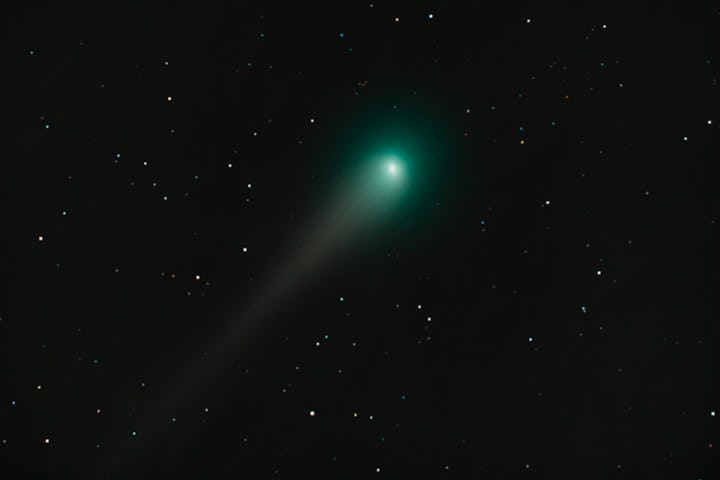Unbelievably Rare Comet C/2022 E3 (ZTF) About To Fly By Earth Can Be Tracked With This Digital Tool
There’s a handy tracker that can help us keep track of when the best time to catch the Comet C/2020 E3 (ZTF), aka the green comet.

We’re just around the corner from having the genuinely once-in-a-lifetime opportunity to see an incredible comet that no one will see again for a long time. Comet C/2022 E3 (ZTF) — soon to shoot by Earth — is such a rare sight that it hasn’t been this close to Earth since the Upper Paleolithic period.
It will likely be tens of thousands of years before the comet shoots by Earth again, if ever at all. So if you’re feeling the pressure, a handy tracker can thankfully help track the best time to catch Comet C/2022 E3 (ZTF), aka the green comet, wherever you live. Here’s everything you need to know about how to use it.
When will Comet C/2022 E3 (ZTF) shoot by?
According to NASA astronomers, the comet will make its closest sweep by Earth on Feb. 1 and Feb. 2, which will be the best dates to try and catch it. The comet will glow green and have an ultra-long tail.
A helpful interactive tool will allow you to track C/2022 E3 (ZTF) in real-time. You can watch it as it makes its way to Earth after passing by the Sun and find the best time for you to catch it for real in the sky.
“Current images of C/2022 E3 (ZTF) show its coma, a surrounding halo of gas and dust, glowing with a greenish hue and a long but faint cometary tail extending from its main body,” according to Space.com.
Can I see the comet before February 1st and 2nd?
Yes! Per Newsweek, until January 28th, there’s a “decent viewing opportunity” to see the comet “given that there will be relatively little interference from moonlight, not to mention that the comet is currently a circumpolar object for observers in North America.” For the uninitiated, that means it’s above the horizon.
The comet could be visible to you from 9 p.m. on Thursday, January 26th until dawn, and on Friday, January 27th and Saturday, January 28th from 7 p.m. until dawn.
Can I see the comet online via livestream?
Also, yes. The Virtual Telescope Project, a digital TV page that features live sky observing sessions, will post a live stream of the comet’s closest fly-by on February 2nd at 11:00 p.m. EST. Check out the livestream link here.
What tool will help me see where the comet is and when it might be passing by?
The tool in question, TheSkyLive.com, is super easy to use, but it can be complicated to understand if you’re unfamiliar with sky maps.
The gist is that the tool allows you to track and follow any object in space relative to where you are on Earth. To do this, you set your location, then the object you want to track, and an interactive map will pop up, showing its location. The tool is embedded below — just click past the privacy notice and start exploring!

For example, if you set the location as New York City and search for C/2022 E3 (ZTF), you can see the comet up in space and get the exact coordinates, including its ascension, magnitude, and distance from Earth (which is 84.75 million kilometers at the time of publishing).
When Newsweek utilized the tool on Jan. 16, it found the comet in the constellation Boötes, and noted it would move into Draco in just a few days.
The map also lets you choose a later date, so we can see that come Feb. 1, the comet will be far closer to us at just a measly 42.47 million kilometers from Earth. And from there, with each hour, the comet gets further from Earth again for those watching from New York.
This tool works for any objects out in space, so it’s a good one to bookmark later for any cool comet that might fly by. But since this is a once-in-a-generation comet, be sure to check it out before the end of the month to track the best time to catch a look at the green comet real life and when it will be as close to you as possible.
For more details, visit TheSkyLive.com.
This article was originally published on